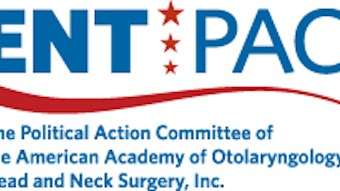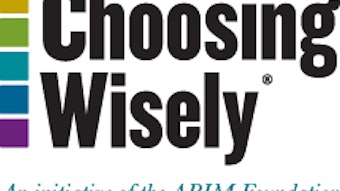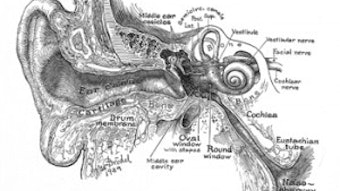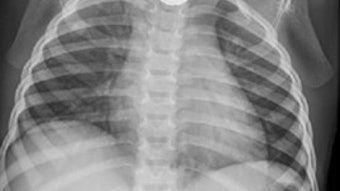Health Policy 101: What Health Policy Does for Members
The Academy’s Physician Payment Policy (3P) Workgroup is the senior advisory body to Academy leadership and staff on issues related to socioeconomic advocacy, regulatory activity, coding and reimbursement, and practice services or management. 3P and the Health Policy staff work to ensure that members’ interests are appropriately represented. 3P oversees the review and content for the Clinical Indicators and the Policy Statements, provides resources to Members, such as template appeal letters, and CPT for ENT coding guidance articles. Coordination with other Academy committees, subspecialties, and medical specialty societies are critical to 3P’s success. Health Policy has two coordinators, who are also the Physician Payment Policy (3P) Workgroup Co-Chairs. James C. Denneny, III, MD, coordinator for Socioeconomic Affairs, oversees all coding and payment issues related to Medicare and the Academy’s efforts to influence the CPT coding and RVS systems through work with the Academy’s members and advisors on the AMA’s CPT Editorial Panel, the Relative Value Update Committee (RUC), and the RUC’s Practice Expense Review Committee (PERC). He also works closely with the Government Affairs Business Unit and Health Policy department to achieve these directives. Dr. Denneny is on the Socioeconomics Committee of the Board of Governors of the ACS and also on its Executive Committee of the Board of Governors. These positions open synergistic opportunities to increase cooperation and build coalitions among the surgical societies as we try to navigate an increasingly hostile landscape for physicians, particularly surgeons. Finally, he is working with other Academy leaders from Research and Quality and the Board of Directors to review potential prospective payment models for possible use by otolaryngology-head and neck surgeons in the future. Michael Setzen, MD, coordinator for Practice Affairs, is responsible for developing and maintaining programs that support and provide practice management-related answers to health policy issues. The coordinator will spearhead collaborative efforts with other specialty societies on priority payer reimbursement issues related to private health insurance policies, publication of the Socioeconomic Survey, and providing input on any related educational programs for the annual meeting. In addition, the coordinator is responsible for publishing periodic practice management articles for the Academy’s Bulletin. Dr. Setzen works closely with Dr. Denneny to ensure a high quality of programs for delivery to both the Board of Directors and to members. Note: Jane T. Dillon, MD, is coordinator-elect for Practice Affairs and will begin her term in October 2013. More of What Health Policy Does for Members Regulatory and Socioeconomic Advocacy Advocate for AAO-HNS members for fair policies by providing comments and meeting face-to-face with the Centers for Medicare and Medicaid Services (CMS) and private payers on ongoing/unresolved otolaryngology-specific issues. Support volunteer participation in RUC and CPT meetings. Partner and participate strategically, with other organizations and stakeholders (e.g. CMS, HHS, AMA, ACS, etc.) in health policy initiatives to ensure our specialty is represented in future payment model development. Practice Affairs-Business of Medicine Provide members and payers/public with comments and guidance (including Clinical Indicators and Position Statements) to represent AAO-HNS members on major payer issues of relevance. Provide coding guidance (ie, ICD10 transition, new codes, etc.) and develop coding articles for publication in The News and Bulletin. Develop Health Policy annual meeting programming on topics that are timely, relevant and practical More AAO-HNS Website Resources Clinical Indicators http://www.entnet.org/Practice/policystatements.cfm Policy Statements http://www.entnet.org/Practice/clinicalIndicators.cfm Template Appeal Letters for Patient notification of in-office diagnostic procedures listed as surgery (new); septoplasty (new); image guidance; microsurgical techniques using microscope; modifier 22; modifier 25; unlisted procedure: http://www.entnet.org/Practice/Appeal-Template-letters.cfm Members only, view previous socioeconomic surveys: http://www.entnet.org/Practice/members/socioeconomic.cfm Zupko Coding Workshops:http://www.entnet.org/ConferencesAndEvents/codingworkshops.cfm eRx resources: http://www.entnet.org/Practice/MedicareERxFactSheet.cfm Meaningful Use EHRs: http://www.entnet.org/Practice/ONC.cfm Health Policy Glossary Resource List AMA = American Medical Association CAC = Medicare Contractor Advisory Committee CPT code = Current Procedural Terminology CMS = Centers for Medicare & Medicaid Services EHR/EMR = Electronic Health/Medical Record ICD-9/ICD-10 = International Classification of Diseases, with “n” = “9” for Revision 9 or “10” for Revision 10, with “CM” = “Clinical Modification,” and with “PCS” = “Procedure Coding System.” MAC = Medicare Administrative Contractor MU = Meaningful Use RUC = Relative Value Scale Update Committee RVU = Relative Value Unit Resource: http://www.cms.gov/apps/glossary/default.asp?Letter=A&Language=English
The Academy’s Physician Payment Policy (3P) Workgroup is the senior advisory body to Academy leadership and staff on issues related to socioeconomic advocacy, regulatory activity, coding and reimbursement, and practice services or management. 3P and the Health Policy staff work to ensure that members’ interests are appropriately represented. 3P oversees the review and content for the Clinical Indicators and the Policy Statements, provides resources to Members, such as template appeal letters, and CPT for ENT coding guidance articles. Coordination with other Academy committees, subspecialties, and medical specialty societies are critical to 3P’s success.
Health Policy has two coordinators, who are also the Physician Payment Policy (3P) Workgroup Co-Chairs.
James C. Denneny, III, MD, coordinator for Socioeconomic Affairs, oversees all coding and payment issues related to Medicare and the Academy’s efforts to influence the CPT coding and RVS systems through work with the Academy’s members and advisors on the AMA’s CPT Editorial Panel, the Relative Value Update Committee (RUC), and the RUC’s Practice Expense Review Committee (PERC). He also works closely with the Government Affairs Business Unit and Health Policy department to achieve these directives.
Dr. Denneny is on the Socioeconomics Committee of the Board of Governors of the ACS and also on its Executive Committee of the Board of Governors. These positions open synergistic opportunities to increase cooperation and build coalitions among the surgical societies as we try to navigate an increasingly hostile landscape for physicians, particularly surgeons. Finally, he is working with other Academy leaders from Research and Quality and the Board of Directors to review potential prospective payment models for possible use by otolaryngology-head and neck surgeons in the future.
Michael Setzen, MD, coordinator for Practice Affairs, is responsible for developing and maintaining programs that support and provide practice management-related answers to health policy issues. The coordinator will spearhead collaborative efforts with other specialty societies on priority payer reimbursement issues related to private health insurance policies, publication of the Socioeconomic Survey, and providing input on any related educational programs for the annual meeting.
In addition, the coordinator is responsible for publishing periodic practice management articles for the Academy’s Bulletin. Dr. Setzen works closely with Dr. Denneny to ensure a high quality of programs for delivery to both the Board of Directors and to members.
Note: Jane T. Dillon, MD, is coordinator-elect for Practice Affairs and will begin her term in October 2013.
More of What Health Policy Does for Members
- Regulatory and Socioeconomic Advocacy
- Advocate for AAO-HNS members for fair policies by providing comments and meeting face-to-face with the Centers for Medicare and Medicaid Services (CMS) and private payers on ongoing/unresolved otolaryngology-specific issues.
- Support volunteer participation in RUC and CPT meetings.
- Partner and participate strategically, with other organizations and stakeholders (e.g. CMS, HHS, AMA, ACS, etc.) in health policy initiatives to ensure our specialty is represented in future payment model development.
- Practice Affairs-Business of Medicine
- Provide members and payers/public with comments and guidance (including Clinical Indicators and Position Statements) to represent AAO-HNS members on major payer issues of relevance.
- Provide coding guidance (ie, ICD10 transition, new codes, etc.) and develop coding articles for publication in The News and Bulletin.
- Develop Health Policy annual meeting programming on topics that are timely, relevant and practical
More AAO-HNS Website Resources
- Clinical Indicators http://www.entnet.org/Practice/policystatements.cfm
- Policy Statements http://www.entnet.org/Practice/clinicalIndicators.cfm
- Template Appeal Letters for Patient notification of in-office diagnostic procedures listed as surgery (new); septoplasty (new); image guidance; microsurgical techniques using microscope; modifier 22; modifier 25; unlisted procedure: http://www.entnet.org/Practice/Appeal-Template-letters.cfm
- Members only, view previous socioeconomic surveys: http://www.entnet.org/Practice/members/socioeconomic.cfm
- Zupko Coding Workshops:http://www.entnet.org/ConferencesAndEvents/codingworkshops.cfm
- eRx resources: http://www.entnet.org/Practice/MedicareERxFactSheet.cfm
- Meaningful Use EHRs: http://www.entnet.org/Practice/ONC.cfm
Health Policy Glossary Resource List
AMA = American Medical Association
CAC = Medicare Contractor Advisory Committee
CPT code = Current Procedural Terminology
CMS = Centers for Medicare & Medicaid Services
EHR/EMR = Electronic Health/Medical Record
ICD-9/ICD-10 = International Classification of Diseases, with “n” = “9” for Revision 9 or “10” for Revision 10, with “CM” = “Clinical Modification,” and with “PCS” = “Procedure Coding System.”
MAC = Medicare Administrative Contractor
MU = Meaningful Use
RUC = Relative Value Scale Update Committee
RVU = Relative Value Unit
Resource:
http://www.cms.gov/apps/glossary/default.asp?Letter=A&Language=English













